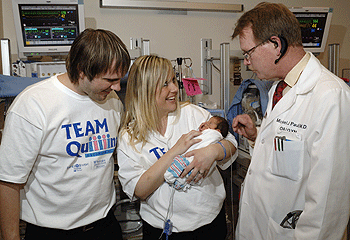On Dec. 21, 2006, Michael Paul, M.D., led a team of 100 physicians, nurses, paramedics and other staff to deliver the “Ferrill Five,” two girls and three boys, at Barnes-Jewish Hospital. The parents are Pete and Jenny Ferrill of Danville, Ill.
These babies were the first quintuplets to be delivered through the Washington University Center for Multiple Births and also the first quints born in the 92-year history of Barnes-Jewish Hospital.

Irelyn Kadyn, Kieran Skye, Landyn Konner, Layne Mykel and Drayden Karter each weighed at least 3.25 pounds and are doing well, although they are expected to stay in the neonatal intensive care unit at St. Louis Children’s Hospital until late February.
Paul and other physicians started the Center for Multiple Births in 1992 in response to a dramatic increase in the number of multiples due to in vitro fertilization and other fertility treatments. The center is one of only a handful of centers nationwide focusing on this specialty. Physicians at the center now deliver an average of 50 sets of twins, 15 sets of triplets and one set of quadruplets each year.
“These women need to be monitored more closely because they are at high risk of developing preterm labor as well as abnormalities in their babies’ growth,” said Paul, associate professor of obstetrics and gynecology and director of the center. “They also need nutritional guidance and extra support.”
A woman pregnant with triplets, for example, needs to eat at least six meals a day and consume an extra 1,000 calories. Patients at the center meet with a nutritionist regularly and receive advice on high-fat, high-calorie foods.
“We want them to eat rice, potatoes, milkshakes and even cheesecake,” Paul said. “We also recommend that they eat a meal in the middle of the night.”
Babies born prematurely often have neurological problems, including cerebral palsy; severe vision or hearing impairment; and cognitive, behavioral and social delays.
Paul and the three other physicians on staff have gained a greater understanding of cervical incompetence and other causes of preterm labor, which has improved the neurodevelopment of babies delivered at the center.
Women who have multiples also face an increased risk of postpartum depression, and the divorce rate among these parents exceeds 70 percent, according to Paul. The center’s staff is keenly aware of the stressors parents of multiples face long-term and goes to great lengths to connect them with national and local parenting organizations that offer resources and support.
Paul said treating the mothers-to-be and delivering babies is extremely rewarding. “The real payoff is getting Christmas cards from these families and seeing that these children are developing normally,” he said.